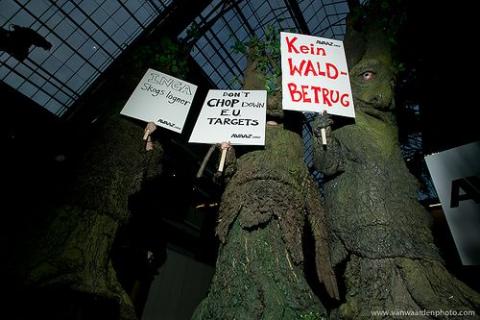What follows is a communiqué from the Latin American Network against Monoculture Tree Plantations (RECOMA) reporting on the violent situation that local communities and Indigenous Peoples of the Lacandona forest in Chiapas are presently going through.
“Appeal to international solidarity to protect the Lacandona Forest in Chiapas (Mexico), February 2010.
Other information
As experts like geographer Carlos Walter Porto-Gonçalves have repeatedly stressed, economic models based on monoculture plantation activities will always be incompatible with a healthy, balanced environment. Any industrial-scale monoculture activity, and especially plantations of millions of cloned eucalyptus trees, cannot contribute to the goal of so-called sustainable development.
There are two realities in the forestry sector in Indonesia. In one, the forests continue to be destroyed, peatswamps are drained, forests are logged, burned and replaced by industrial tree plantations. Indigenous Peoples' and local communities' rights are bulldozed along with the forests. Meanwhile, in the other reality, trees are planted, forests are restored and greenhouse gas emissions will soon become a thing of the past.
Pine and eucalyptus planting companies are advancing on land belonging to peasant family communities in several provinces in northern Mozambique. This is a relatively recent process, encouraged by the Mozambique Government that sees monoculture tree plantations as a tool to promote development and progress in the more remote regions such as the province of Niassa.
Natural forests aren’t the only landscapes being taken over by timber plantations. South Africa’s biologically diverse native grasslands are being rapidly replaced by water-intensive monocultures including eucalyptus and tropical pine – trees used for paper pulp exports.
Everywhere in the world where large-scale monoculture tree plantations are established, their arrival is preceded by a series of promises used to trick the local population into welcoming these ventures. After a few years have gone by, people start to realize that these promises are not being kept, and that things are actually even worse than before. But by then it is too late. The companies have taken over the area and set up their plantations.
The term “planted forests” was coined by FAO with the aim of placing tree plantations on the same level as forests. Gradually it has spread and been assimilated by many international and national organizations, while multinational corporations from the forestry sector have taken advantage of this to emphasize the matching, as was evident at the latest World Forestry Congress, held in Argentina in October 2009.
The UN Climate Change Convention in Copenhagen presents itself to the world as if it were truly tackling the major global crisis of climate change, with thousands of government delegates and even a hundred or so presidents and heads of state joining the meeting.
By Global Justice Ecology Project
By Rebecca Sommer
At the Climate Change Conference in Copenhagen, Indigenous participants are increasingly concerned about REDD.
REDD stands for “Reducing Emissions from Deforestation and Degradation”. The idea, as agreed by United Nations climate negotiators in Bali in 2007, is that because preserving forests is good for the climate, governments, companies or forest owners in the South should be rewarded for keeping them standing instead of cutting them down.
According to Wikipedia, “a circus is commonly a travelling company of performers that may include acrobats, clowns, animals, trapeze acts, hoopers, tightrope walkers, jugglers, unicyclists and other stunt-oriented artists.”
A team of biologists and climate modellers at NASA have come up with a very “practical” alternative to phasing out fossil fuels. Their plan is to plant massive blocks of fast growing trees –for example eucalyptus- in the deserts of the Sahara and Australian outback. Lack of water? No problem! The trees would be watered by seawater treated by a string of coastal desalination plants and channelled through a vast irrigation network. Easy.

